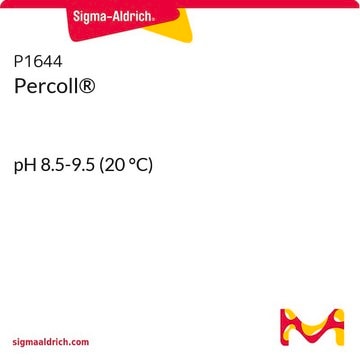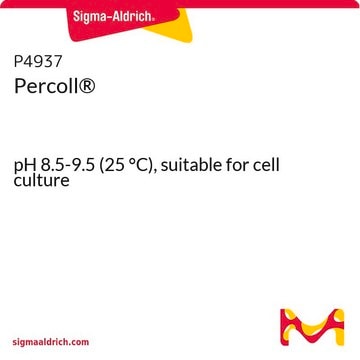GE17-5445-02
Percoll® PLUS
Cytiva 17-5445-02, pack of 250 mL
About This Item
Polecane produkty
sterylność
non-sterile (LOW ENDOTOXIN (2 EU/ml))
Postać
colloidal (Colloidal solution of silica particles coated with silane)
liquid (Suspension)
solution
opakowanie
pack of 250 mL
producent / nazwa handlowa
Cytiva 17-5445-02
kolor
Colorless to slightly yellow
zakres pH
8.9-9.9
Szukasz podobnych produktów? Odwiedź Przewodnik dotyczący porównywania produktów
Powiązane kategorie
Opis ogólny
Cell separation with the medium is performed under gentle conditions, facilitating the isolation of a variety of cells, subcellular particles, and viruses where preservation of viability and morphological integrity is important. The low toxicity of Percoll PLUS ensures that removal of the medium from separated cellular particles is not usually necessary.
After adjustment, Percoll PLUS forms iso-osmotic gradients within the density range of 1.0 to 1.3 g/ml. This density range is especially useful since most cells, subcellular particles, and viruses have a buoyant density of 1.0 to 1.2 g/ml in Percoll PLUS.
Zastosowanie
The medium is also suited to applications where high-speed centrifugation is required. In this case, the sample can be premixed with the medium and subsequently separated on the continuous gradient formed in situ. Thus, gradient
formation and sample separation can be achieved in one step.
All experiments described in the literature using Percoll® can also be performed with Percoll PLUS.
Cechy i korzyści
- Low endotoxin levels (max. 2 EU/ml)
- Absence of toxicity for cells and very low chemical reactivity
- Low osmolality: Percoll PLUS can easily be adjusted with physiological saline, other balanced salt solutions, or cell culture media, to give gradients that are iso-osmotic throughout
- Low viscosity resulting in rapid formation of gradients and particle separation at low centrifugal forces
Przechowywanie i stabilność
Komentarz do analizy
Informacje prawne
Kod klasy składowania
12 - Non Combustible Liquids
Certyfikaty analizy (CoA)
Poszukaj Certyfikaty analizy (CoA), wpisując numer partii/serii produktów. Numery serii i partii można znaleźć na etykiecie produktu po słowach „seria” lub „partia”.
Masz już ten produkt?
Dokumenty związane z niedawno zakupionymi produktami zostały zamieszczone w Bibliotece dokumentów.
Klienci oglądali również te produkty
Nasz zespół naukowców ma doświadczenie we wszystkich obszarach badań, w tym w naukach przyrodniczych, materiałoznawstwie, syntezie chemicznej, chromatografii, analityce i wielu innych dziedzinach.
Skontaktuj się z zespołem ds. pomocy technicznej









